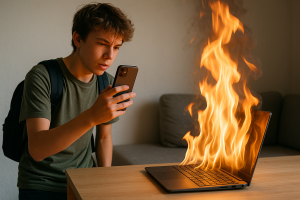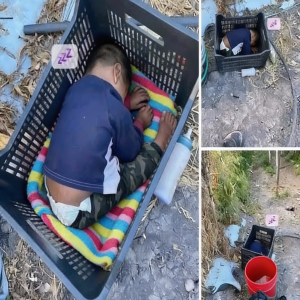Social media has sparked countless trends—some harmless, some humorous, and others outright dangerous. But a new challenge making the rounds online, known as the “Chromebook Challenge,” has schools, parents, and safety experts on high alert.
The challenge encourages students to deliberately damage or even set fire to their school-issued laptops while recording the destruction for likes and shares. What may look like a prank for internet clout is, in reality, a deeply dangerous act that threatens not just property but lives.
The trend reportedly began with a viral TikTok video in which a student placed his Chromebook in an oven “to test its durability.” The clip, though quickly deleted, inspired others to replicate the stunt—escalating it into more extreme and hazardous experiments. Soon, videos showed laptops sparking, smoking, and in some cases, bursting into flames.
For schools, the consequences are severe. Chromebooks are standard equipment across thousands of U.S. districts, often purchased in bulk to support digital learning. Damaging these devices isn’t just costly—it deprives students of essential tools for their education. One superintendent noted that replacing even a handful of devices strains already limited budgets.
But beyond finances, the risks to safety are far greater. Fire officials warn that lithium-ion batteries, commonly used in laptops, can explode when punctured, overheated, or exposed to flames. These explosions release toxic fumes and can ignite surrounding materials in seconds. “It’s not a joke,” one fire marshal explained. “A stunt like this can cause serious burns or even burn down a room.”
Parents have expressed outrage and concern. “We tell our kids not to play with fire, and now TikTok is teaching them the opposite,” one mother said. Schools are scrambling to respond, sending home letters urging families to talk to their children about the dangers of the challenge. Some districts have begun monitoring devices more closely, tracking unusual activity that might signal tampering.
Experts also warn that online challenges exploit the psychology of teenagers. The drive for attention, validation, and belonging often outweighs rational decision-making. “Kids don’t always think about the long-term consequences,” a child psychologist explained. “They see likes and shares as rewards, and risk becomes invisible.”

The Chromebook Challenge is only the latest in a troubling series of dangerous online fads. From the “Tide Pod Challenge” to the “Milk Crate Challenge,” social media has repeatedly shown how quickly harmful behaviors can spread when packaged as entertainment. What makes this case particularly alarming is the involvement of school property and the potential for catastrophic fire hazards.
Educators are calling for greater accountability from social media platforms. “These companies have to do more to prevent harmful content from going viral,” one teacher said. “It shouldn’t take dozens of burned laptops before action is taken.” Some platforms have since banned the hashtag associated with the challenge, but critics argue the response came too late.
Yet amid the chaos, there is a silver lining: stories of students pushing back. Many teens are speaking out against the trend, creating counter-videos that highlight the dangers and encourage peers to make safer choices. These voices of reason may prove to be the strongest antidote to the allure of risky challenges.
Parents are advised to stay engaged, not just by warning their kids but by asking questions, staying aware of trends, and building trust so that teens feel comfortable discussing online pressures. Safety experts stress that open communication is key to prevention.
For now, the Chromebook Challenge serves as a stark reminder of the double-edged sword of viral culture. The same platforms that can spread joy, creativity, and knowledge can also fuel recklessness and harm.
As one high school principal put it, “We want our students to be innovators, not imitators of dangerous stunts. Education should empower them to think critically, not risk their futures for a fleeting moment of internet fame.”
The message from authorities is clear: destroying a laptop may seem like a joke, but the fire it starts is no laughing matter. Lives are too valuable, and futures too important, to be wasted chasing viral clicks.









